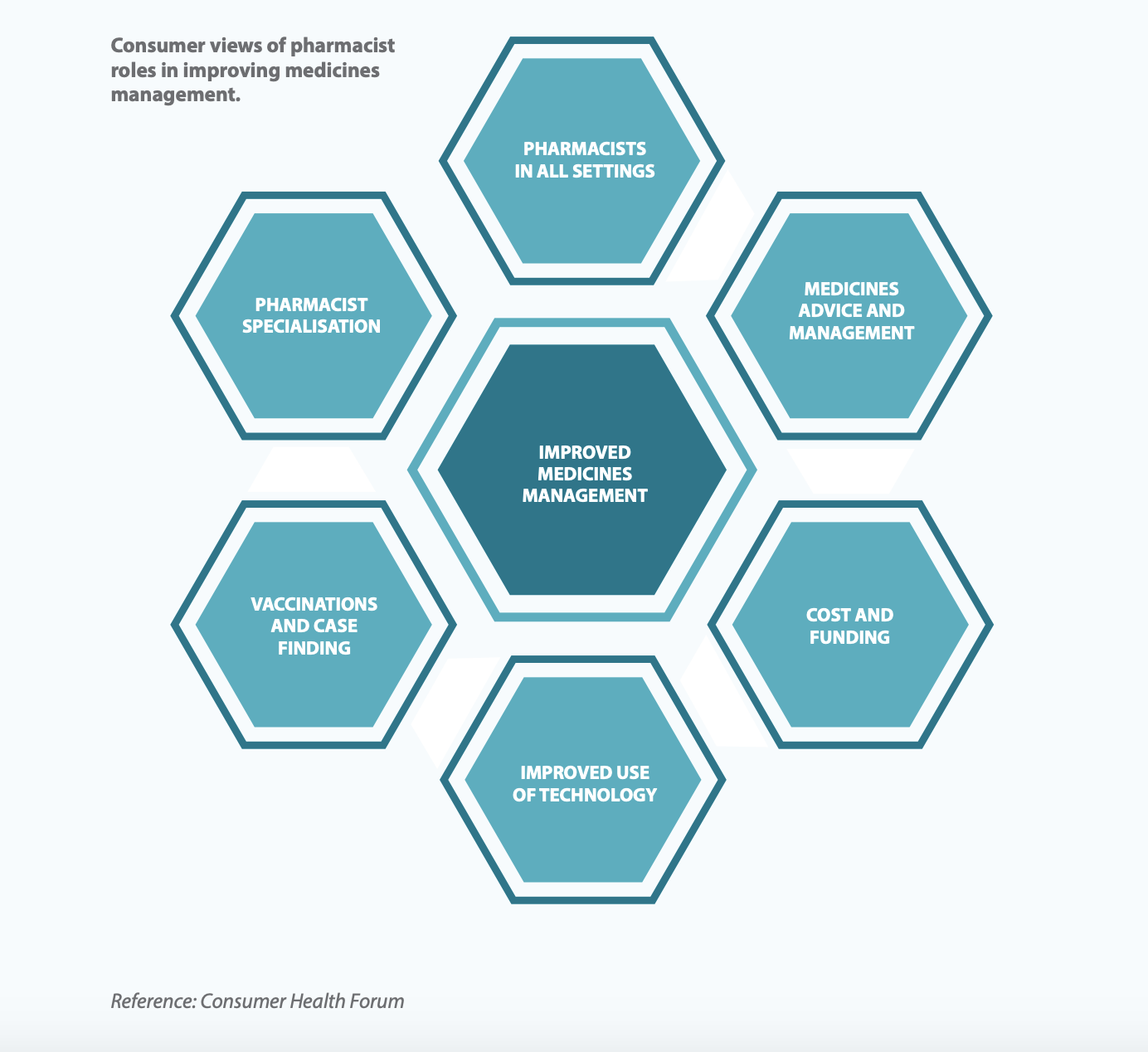Consumers desire greater specialisation and increased services from the pharmacy profession, which should be front of mind in community pharmacy practice.
Consumer input into pharmacy service design, demand and need is highly valuable. This is highlighted in the Pharmacists in 2023 report, which demonstrates that consumers are well aware of the gap in patient care in the healthcare sector that can be effectively filled by pharmacists.
In 2017, PSA commissioned the Consumers Health Forum to conduct a consultation forum with consumer advocates and a population-based survey of Australian consumers. Over 1,000 consumers participated in the survey, who were nationally representative in terms of age, gender and location as measured by the 2017 Census.
Many regularly visited pharmacies for health-related reasons, with 42% having visited a pharmacy for a health-related reason 13 or more times in the last 12 months. More than half (57%) reported high use of prescription medicines. The participants were asked about their current and potential use of services.
Consumers clearly said they wanted pharmacists to focus more on helping them manage their medicines. The respondents reported that this central outcome of improved medicines management must be supported by six enablers of: specialisation, medicines advice and management, vaccinations and case finding, improved technology use, improved accessibility and funding and having the expertise of pharmacists available in all health settings.
Consumers would like to see pharmacists included as part of collaborative healthcare teams (72%), as well as present in general practices to provide advice on medicine management (70%) and reconciling medicines (69%). Expanded pharmacy immunisation services also factored highly (68%).
 The changes consumers want to see
The changes consumers want to see
Consumers value the traditional walk-in services offered by community pharmacies, but often find it difficult to locate pharmacists that specialise in areas of need, such as pain management. This challenges pharmacists to better communicate their training and skills in specific healthcare areas.
Building on the value of walk-in services, consumers said they would appreciate more pharmacists being available to give healthcare advice (a greater pharmacist-to-consumer ratio) and the development of genuinely private counselling spaces to discuss issues, particularly where privacy and stigma were of concern.
Consumers suggested that they would value an increased use of technology within community pharmacies, with electronic health records considered to provide pharmacists with accurate and reliable access to information about patient diagnosis and the provision of medicines.
My Health Record (MHR) was the favoured electronic health database to implement in community pharmacies, due to the completeness of the record offered. Prescription records, available through MHR, were seen as a way to cease or reduce medicines errors.
Consumer needs and preferences were key inputs into formulating Pharmacists in 2023 report. These insights are strongly seen in:
- Action item 1 – Empower and expect all pharmacists to be more responsible and accountable for medicine safety
- Action item 2 – Enhance the role of community pharmacists to have a greater level of responsibility and accountability for medicines management
- Action item 3 – Embed pharmacists within healthcare teams to improve decision-making for the safe and appropriate use of medicines
- Action item 4 – Facilitate pharmacist prescribing within a collaborative care model
- Action item 5 – Improve pharmacist stewardship of medicine management to improve outcomes at transitions of care
- Action item 6 – Utilise and build upon the accessibility of community pharmacies in primary care to improve consumer access to health services
- Action item 9 – Allow greater flexibility in funding and delivery of pharmacist care to innovate and adapt to the unique patient needs in all areas, with a specific focus on regional, rural and remote areas
- Action item 11 – Embrace digital transformation to improve the quality use of medicines; support the delivery of safe, effective and efficient healthcare, and facilitate collaborative models of care.
To find out how these consumer needs can be addressed, read the full Pharmacists in 2023 report here.



 John Jones MPS, pharmacist immuniser and owner of My Community Pharmacy Shortland in Newcastle, NSW[/caption]
John Jones MPS, pharmacist immuniser and owner of My Community Pharmacy Shortland in Newcastle, NSW[/caption]


 Debbie Rigby FPS explaining how to correctly use different inhaler devices[/caption]
Debbie Rigby FPS explaining how to correctly use different inhaler devices[/caption]




 Professor Sepehr Shakib[/caption]
Professor Sepehr Shakib[/caption]

 Lee McLennan MPS[/caption]
Lee McLennan MPS[/caption]
 Dr Natalie Soulsby FPS, Adv Prac Pharm[/caption]
Dr Natalie Soulsby FPS, Adv Prac Pharm[/caption]
 Joanne Gross MPS[/caption]
Joanne Gross MPS[/caption]





